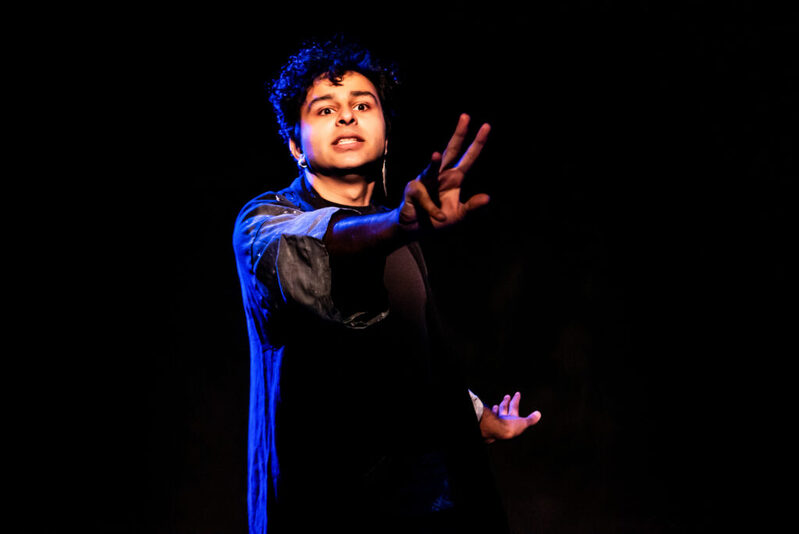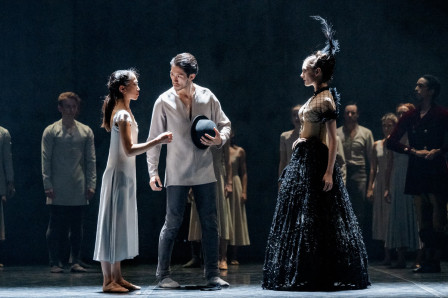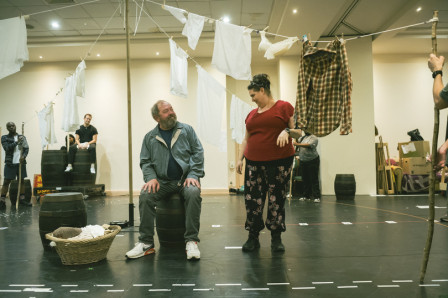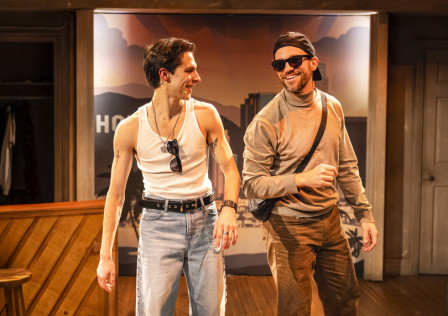Review: THE GODLESS WAR at Bread & Roses Theatre
The most powerful stories in theatre - the ones that linger long after the curtain falls - are those that transcend their immediate plots and moral messages.
 The Godless War production image. Photo by Lidia Crisafulli.
The Godless War production image. Photo by Lidia Crisafulli.
These stories are fluid, reshaped by each listener’s own experiences, and offer layers of meaning open to endless interpretation. Their impact depends not just on who tells them, but also on who listens. One might argue that the true strength of a story lies in its capacity to resonate across time and place - to teach, to provoke, and to connect.
Storytellers, throughout history, have wielded immense influence. The ability to hold an audience with nothing but language and presence is rare, and when a storyteller reveals something universal-something recognisably human-then such a performance can be deeply transformative. Their words reflect and refract our shared world, shaping how we see ourselves and others.
Contemporary theatre, however, often shies away from the raw, almost sacred, simplicity of storytelling. Perhaps this is because very few performers can actually capture and sustain attention through voice alone. The Godless War, written and performed by Arif Silverman and directed by Kareem Akinsanya and Naha Hemachandra, attempts exactly this. A one-man show, it hinges entirely on the power of Silverman's words and presence. Over 75 minutes, he takes on the role of the last survivor of his people, recounting their fantastical history - how they were destroyed, consumed by war, and scattered.
The concept is compelling, and Silverman is undoubtedly a passionate writer and performer. He brings warmth, energy, and detail to the world he conjures. The lighting and sound design offer effective, minimalistic support, transforming a bare stage into a universe of shifting emotions, tones, and spaces. It’s theatre stripped to its bones: a story, a stage, a voice.
Yet despite its ambition, The Godless War struggles to truly connect. Though well-written and performed with gusto, the show remains oddly distant - more a private vision than a shared journey. The fantasy elements, though richly imagined, feel insular. It’s as if we’re watching someone enact their dreamscape from the outside, unable to find a foothold. A bit like reading fan fiction of a world we’re not already invested in, we struggle to care.
If done well, Fantasy stories use imaginary to illuminate real human experience. But here, the allegorical elements arrive too late. The show only hints at its broader message - about war, displacement, and humanity’s darker instincts - toward the very end. When Silverman finally declares that ‘such images of death should not exist’, it lands as a poignant, timely statement. But it’s not enough to anchor what has come before.
The problem isn’t Silverman’s ability - his commitment is clear, his energy infectious - but rather the structure of the piece. The narrative feels like a prologue stretched into a full performance. Like a Greek chorus locked into relating an introduction to an epic tale, we wait for the moment when we’re invited in, but that moment never comes.
There’s something admirable in The Godless War’s attempt to return to the oral tradition, to theatre in its purest form. But without stronger emotional anchors or clearer links to the audience’s own world, the piece remains emotionally detached. For all its ambition, it feels more like one man working through a personal myth than a story meant to move a room full of strangers.
In the end, despite Silverman’s evident talent and conviction, The Godless War feels like a missed opportunity - ambitious in scope, but ultimately too inward-looking to land its blows. It reminds us of the power of storytelling, but also of the delicate balance required to make a story truly universal.
The Godless War plays at the Bread & Roses Theatre until 12 July.
Latest News

 Cast announced for major London revival of The Holy Rosenbergs
19 January 2026 at 09:00
Cast announced for major London revival of The Holy Rosenbergs
19 January 2026 at 09:00

 Akram Khan's Giselle at London Coliseum review
18 January 2026 at 20:39
Akram Khan's Giselle at London Coliseum review
18 January 2026 at 20:39

 The Unlikely Pilgrimage of Harold Fry at Theatre Royal Haymarket - Rehearsal images released
16 January 2026 at 15:41
The Unlikely Pilgrimage of Harold Fry at Theatre Royal Haymarket - Rehearsal images released
16 January 2026 at 15:41

 ALREADY PERFECT at King's Head Theatre Review
16 January 2026 at 10:25
ALREADY PERFECT at King's Head Theatre Review
16 January 2026 at 10:25
